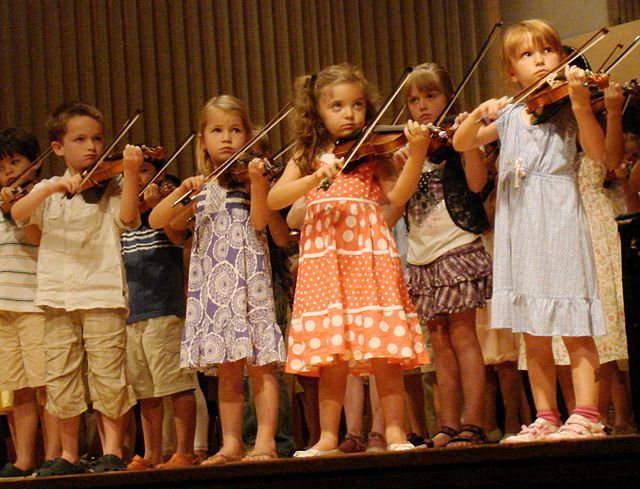童年是从出生跨越到青春期的年龄时间段[1][2][3]。童年也可能包括青少年,但无论如何都是在成年之前。童年一般由两个阶段组成:前运算阶段(preoperational stage)和具体运算阶段(concrete operational stage)。在发展心理学中,童年被分为四个发展阶段,即婴儿期(学步期),儿童早期(玩耍期),儿童晚期(学龄期),以及青春期(青春期至后青春期)。各种各样的童年因素会影响一个人人生态度的形成。[1]
| 此条目 论述以部分区域为主,未必有 普世通用的观点。 (2010年3月1日) |
 北京东南城角儿童
北京东南城角儿童
 非洲儿童
非洲儿童
童年是一个让孩子学习、玩耍的时间段,是一个让孩子在家庭的爱和鼓励、及许多成人关心下变得坚强与自信的时间段。这个年龄的孩子,生活没有恐惧,远离暴力、虐待和剥削。正因如此,童年绝非仅是出生与成为成人期间的间隔。它指的是儿童的生活状态和条件,及这些年的生活品质。[4]
童年的具体时间并不明确,它可以指人类发展中的一段长时间。以发育和生物学而言,它指的是婴儿期与成年期之间的时期。一般而言,童年从出生开始。也有人认为,童年是玩耍和纯真的代名词。许多国家的法律中规定了着法定成人年龄,即一个人的童年正式结束,而在法律上成为成人的年龄。这一年龄各国有所不同,一般在15到20岁之间,其中以18岁最为普遍。
 一组儿童在演奏小提琴。
一组儿童在演奏小提琴。
麦克米伦学生词典(Macmillan Dictionary for Students)Macmillan, Pan Ltd. (1981),第173页。于2010-7-15检索。
联合国儿童基金会(UNICEF),世界儿童发展报告。于2005年检索。
- Ariès, Philippe. Centuries of Childhood: A Social History of Family Life. New York: Alfred A. Knopf, 1962.
- Boas, George. The Cult of Childhood. London: Warburg, 1966.
- Brown, Marilyn R., ed. Picturing Children: Constructions of Childhood between Rousseau and Freud. Aldershot: Ashgate, 2002.
- Buckingham, David. After the Death of Childhood: Growing Up in the Age of Electronic Media. Blackwell Publishers, 2000. ISBN 0-7456-1933-9.
- Bunge, Marcia J., ed. The Child in Christian Thought. Grand Rapids, MI: William B. Eerdmans Publishing Co., 2001.
- Calvert, Karin. Children in the House: The Material Culture of Early Childhood, 1600-1900. Boston: Northeastern University Press, 1992.
- Cleverley, John and D.C. Phillips. Visions of Childhood: Influential Models from Locke to Spock. New York: Teachers College, 1986.
- Cannella, Gaile and Joe L. Kincheloe. "Kidworld: Childhood Studies, Global Perspectives, and Education". New York: Peter Lang, 2002.
- Cunningham, Hugh. Children and Childhood in Western Society since 1500. London: Longman, 1995.
- Cunnington, Phillis and Anne Buck. Children’s Costume in England: 1300 to 1900. New York: Barnes & Noble, 1965.
- deMause, Lloyde, ed. The History of Childhood. London: Souvenir Press, 1976.
- Higonnet, Anne. Pictures of Innocence: The History and Crisis of Ideal Childhood. London: Thames and Hudson Ltd., 1998.
- Immel, Andrea and Michael Witmore, eds. Childhood and Children’s Books in Early Modern Europe, 1550-1800. New York: Routledge, 2006.
- Kincaid, James R. Child-Loving: The Erotic Child and Victorian Culture. New York: Routledge, 1992.
- Knörr, Jacqueline, ed. Childhood and Migration. From Experience to Agency. Bielefeld: Transcript, 2005.
- Müller, Anja, ed. Fashioning Childhood in the Eighteenth Century: Age and Identity. Burlington, VT: Ashgate, 2006.
- O’Malley, Andrew. The Making of the Modern Child: Children’s Literature and Childhood in the Late Eighteenth Century. London: Routledge, 2003.
- Pinchbeck, Ivy and Margaret Hewitt. Children in English Society. 2 vols. London: Routledge, 1969.
- Pollock, Linda A. Forgotten Children: Parent-child relations from 1500 to 1900. Cambridge: Cambridge University Press, 1983.
- Postman, Neil. The Disappearance of Childhood. New York: Vintage, 1994.
- Schultz, James. The Knowledge of Childhood in the German Middle Ages.
- Shorter, Edward. The Making of the Modern Family.
- Sommerville, C. John. The Discovery of Childhood in Puritan England. Athens: University of Georgia Press, 1992.
- Steinberg, Shirley R. and Joe L. Kincheloe. Kinderculture: The Corporate Construction of Childhood. Westview Press Inc., 2004. ISBN 081339157.
- Stone, Lawrence. The Family, Sex and Marriage in England 1500-1800. New York: Harper and Row, 1979.
- Zornado, Joseph L. Inventing the Child: Culture, Ideology, and the Story of Childhood. New York: Garland, 2001.



